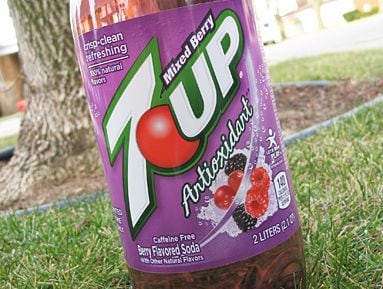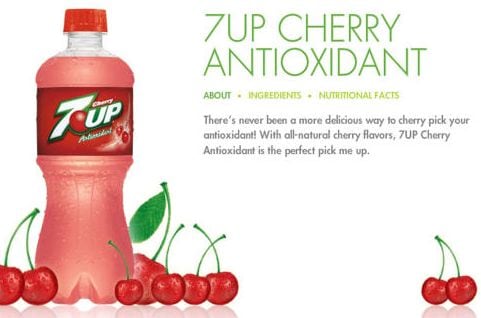In court papers responding to the beverage giant’s motion to dismiss the case (which Green filed in late 2012), Green’s attorneys argue that the central issue at stake - whether 7UP’s marketing was false and misleading - is not pre-empted by federal law, as the company claims.
They add: “Defendants’ marketing conveyed to consumers that the products [Cherry 7UP Antioxidant, Mixed Berry 7UP Antioxidant, and Pomegranate 7UP Antioxidant] are healthful, natural, and antioxidant-rich beverages that derived their antioxidant content from real cherries, berries, or pomegranates."
In fact, the antioxidants in the 7UP range - which the company said it was dropping late last year - are from added vitamin E, not the fruits on the label.
"None of the products contained any juice from cherries, berries, or pomegranates; nor do the products contain many of the antioxidants contained in cherries, berries, or pomegranates…”
Such false or misleading representations are not allowed under state or federal law
In their motion, “defendants try to hide behind the law of federal preemption” by arguing that their claims are “factually correct and required by federal law”, add Green's lawyers.
But this is merely an “attempt to distract from the fact that the central issue in this matter is a question of consumer deception”, they say.
“Such false or misleading representations are not allowed under state or federal law, and are, therefore, not subject to preemption.
“All FDA labeling requirements, including those cited by defendants, are subject to Section 343(a), which prohibits any food labeling thatis false or misleading.”
Dr Pepper: ‘Surely plaintiff does not expect Court to believe that a consumer would equate drinking a fruit-flavored carbonated soda with eating a fresh pomegranate’
In its defense, Dr Pepper Snapple Group argues that it never promoted the 7UP antioxidant drinks as a replacement for fruits or vegetables, and that Green “surely does not expect this Court to believe that any reasonable consumer would equate drinking a well-known fruit-flavored carbonated soda beverage with eating a fresh pomegranate or consuming real berries”.
“Actually”, argue Green’s lawyers, “that is exactly what the Court, or more appropriately, a jury… should believe.
“As the FDA explained when it promulgated its fortification policy in 1980, [it] also believes it is inappropriate to fortify snack foods such as candies and carbonated beverages [because this] could readily mislead consumers to believe that substitution with fortified snack foods would ensure a nutritionally sound diet”.
Defendants misled consumers by the names of the products themselves

They add: “Defendants misled consumers by the names of the products themselves: Cherry 7UP Antioxidant, Mixed Berry 7UP Antioxidant, and Pomegranate 7UP Antioxidant. Further, defendants misled consumers by prominently placing the word ‘antioxidant’ near pictures of the named fruits on the labels for the products and in other marketing materials.”
This misled consumers because the beverages in question do not contain juices or anything derived from cherries, berries, or pomegranates, note Green’s lawyers.
“Nor do they provide the same health benefits as antioxidants from these fruits or their juices or help consumers maintain healthy dietary practices.”
‘Defendants do not comply with FDA rules on fortification’

Meanwhile, Dr Pepper Snapple Group also “glosses over” its “violations of FDA regulations, which are indisputably actionable under [California] state laws such as the Unfair Competition Law”, claim Green’s attorneys.
“The FDA says that a nutrient content claim regarding fortification with an antioxidant can be used only if the claim complies with the fortification policy in 21 C.F.R. § 104.20 and if thename of the antioxidant is included as part of the claim.
“Defendants… do not comply with the fortification regulation, and they violate § 101.54(g) by not appropriately listing the name of the antioxidant.”
Defendants’ labels do not comply with this regulation either
Finally, FDA regulations also require that a beverage purporting to contain fruit juice - when it in fact contains no fruit juice - must be labeled in a way that informs consumers that it does not contain juice, they add.
“Defendants’ labels do not comply with this regulation either. Additionally, no FDA regulation permits misrepresentation of the source for antioxidants in a food product.”
The case was filed in the US district court in the central district of California on November 8, 2012 (David Green v Dr Pepper/Seven Up and Dr Pepper Snapple Group, case no. 2:12-cv-09567).
Green is represented by Reese Richman LLP and the Center for Science in the Public Interest (CSPI), which successfully persuaded Cadbury Schweppes (which later became a part of the Dr Pepper Snapple Group) to remove ‘100% natural’ claims about 7UP in 2007 after threatening legal action.
Dr Pepper Snapple Group did not respond to requests for comment on the case.
